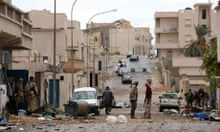Amid many questions about the future of post-Gaddafi Libya, one fact cannot be ignored: the Libyan revolution of 2011 is dissimilar – in scope, content, and origin – to its sister revolutions in Tunisia and Egypt. Indeed, it has almost no parallels in world history.
Generally, sweeping revolutionary change (France in 1789, Russia in 1917, etc) is carried out by an organised group at the centre of power with a distinct ideology. In Libya, the revolution originated in the periphery and is surprisingly devoid of ideology.
As with the French and the Russian revolutions, this year's events in Libya have caused extensive social, political, and structural inversions. By comparison, regime change in Tunisia and Egypt is akin to the "regime change" that democratic countries experience every few years when one leadership group is thrown out and replaced by a new one – generally from within the elites. In this process, the middle-level bureaucrats in the civil service, army, foreign service and local politicians are largely unaffected.
Optimists will note that in Egypt and Tunisia constitutional change is also expected – meaning a rebalancing of the roles of president, army, legislature, bureaucracy, and people. Realists will note that although the future constitutions of these countries are likely to weaken the role of the president and eliminate the use of emergency laws, they are unlikely to fundamentally change the connection between the state, citizens and army or to invert the social classes as the French or Russian revolutions did, or as the Libyan one probably will.
Libya's revolution was unusual in that it was accomplished by many disparate but highly cohesive local movements that eventually liberated the capital by force. In Libya, a diffuse periphery dominates the centre – and it is hard to think of any other historical revolutionary movement where this was the case.
As a result, there is a danger of "regionalist triumphalism" where "a series of local movements each proclaim their centrality to defeating Gaddafi in an attempt to claim a privileged position in the new Libya," Lisa Anderson, president of the American University of Cairo, suggested in a phone interview.
What united all of these disparate localities was a distaste for Gaddafi and his centralism. Now Gaddafi is gone. A US diplomat described it to me as follows: "The situation on the ground bears an uncanny resemblance to how the different American states joined together out of their distaste for King George. Once he was gone, stitching the states together was highly problematic. In Libya, the situation of building a nation is even more complex because it is lacking in robust state-level institutions."
Lacking modern bureaucratic institutions, Libyans are closer to their "primordial" local social organisations. In Libya, truly national institutions and a truly national discourse have never arisen (even though Libyans do want them). Libyans of all localities rebelled against Gaddafi's farce of a jamahiriya – his invented system of "massocracy" whereby the Libyan people were supposed to rule themselves via decentralised local councils – by demanding the creation of a new Libya where traditional decentralised local networks will have access to power.
Today's Libyan revolutionaries want locally accountable power and institutions that govern them according to a rule of law, but not in a western way. Rather, many of them appear to wish for traditional kinship and local networks to create a social web connecting all Libyans to the state and to each other.
Looking forward, the NTC has frequently acknowledged the existence of a ground-swell of "localist" opinion that it would have to successfully appease to unite post-Gaddafi Libya. Mahmoud Jibril promised to step down after the liberation to appease this sentiment.
Many insiders claim that the NTC bought itself time by purposefully delaying the full conquest of Bani Walid and Sirte until it had completed behind-the-scenes dealings that would make it ready to announce an interim government that would not upset local power brokers.
One can hope that with two months to prepare since the fall of Tripoli the NTC has figured out how to honour local communities' desires to control their own affairs yet to simultaneously receive patronage from a unified Libyan state. Once an interim government is announced we will begin to see if Libya's new political leaders can march in step with the demands of their people.






